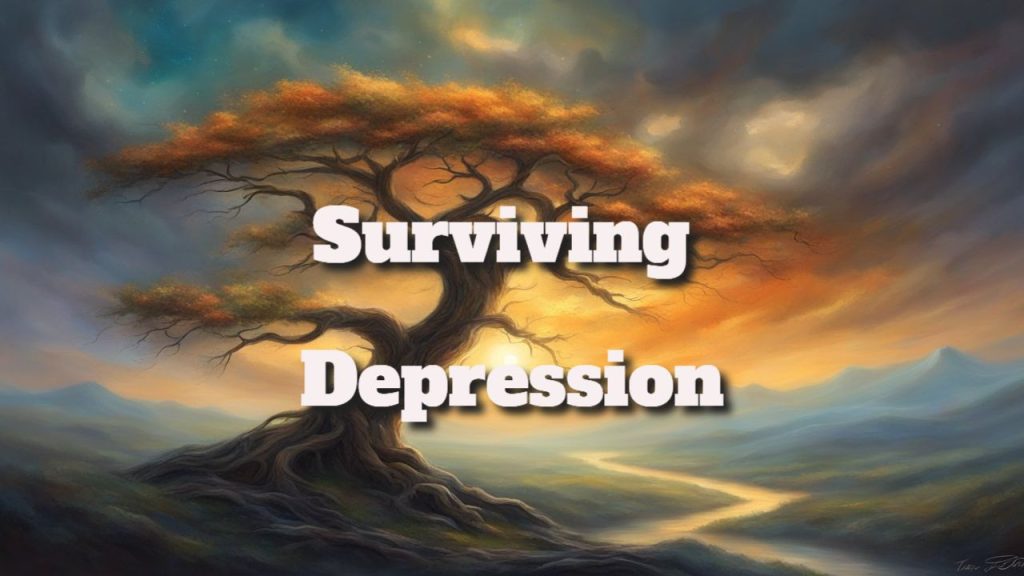Surviving Depression: Practical Strategies for Coping and Recovery
Depression is a prevalent mental health condition characterised by persistent feelings of sadness, loss, or anger that interfere with a person’s everyday activities. It goes beyond occasionally feeling blue; it is a deep-seated condition that can profoundly affect one’s life, impacting mood, thoughts, physical health, and behaviour. It is essential, however, to understand that depression is not indicative of personal weakness or a condition that can be willed away. Instead, it often requires long-term treatment involving therapy, medication, or a combination of these, along with lifestyle changes and support.
Managing depression involves recognising the condition’s complexity and understanding that recovery is a gradual process. Regular physical activity has been shown to elevate mood and enhance self-esteem – the body releases endorphins during exercise, which are natural mood lifters. Additionally, maintaining social connections is crucial since isolation can exacerbate symptoms. The exchange of support and feeling understood can make a significant difference. Mindfulness and other coping strategies can also significantly manage daily stresses and negative thought patterns.
People with depression might perceive their situation as impossible, yet countless individuals navigate through it with the appropriate support and self-care strategies. Resources are available at various health services, including the NHS, which provide accessible information and guidance on coping mechanisms and support networks. It’s also increasingly recognised that feelings of depression, while challenging, can be a natural response to life’s adversities and stress, hinting at the body’s intrinsic desire to protect and cope with danger. Understanding this can contribute to a more compassionate self-perception and open avenues for more personalised treatment and survival strategies.
Understanding Depression
Depression is a complex mental health condition that affects millions worldwide, characterised by persistent low mood and a lack of interest or pleasure in activities.
Defining Depression
Depression is more than just a bout of the blues; it is a clinically recognised disorder that impacts an individual’s mood, thoughts, physical health, and daily functioning. It is typically diagnosed when an individual experiences consistent symptoms of depression that last for two weeks or longer.
Symptoms and Diagnosis
To diagnose depression, healthcare professionals look for specific symptoms, including but not limited to:
- Persistent sad, anxious, or “empty” mood
- Loss of interest or pleasure in hobbies and activities
- Feelings of hopelessness or pessimism
- Irritability
- Fatigue and decreased energy
- Difficulty concentrating, remembering, or making decisions
- Appetite and/or weight changes
- Thoughts of death or suicide, or suicide attempts
A formal diagnosis usually requires a thorough evaluation, which may involve a physical examination, interview, and/or psychological questionnaires.
Common Causes and Risk Factors
Depression does not have a single cause; instead, it results from a combination of genetic, biochemical, environmental, and psychological factors. Risk factors vary among individuals but commonly include:
- Family history of depression
- Significant life changes, trauma, or stress
- Certain physical illnesses and medications
Understanding these risk factors can help in early identification and intervention, potentially mitigating the severity of depression.
Developing Coping Strategies
Effectively managing depression involves establishing a set of practical coping strategies. These methodologies are vital in maintaining one’s mental health and in navigating daily challenges.
Building a Support System
A robust support system is fundamental. Individuals should maintain contact with friends and family who can provide emotional backing. Additionally, joining support groups or seeking out peers who understand their experience can be invaluable.
Self-Care Techniques
Prioritising self-care is essential. Regular exercise not only improves mood but also benefits overall health. Individuals should maintain a balanced diet, ensure adequate sleep, and engage in activities that bring joy and relaxation.
Stress Management
Managing stress plays a critical role in mitigating depressive symptoms. Techniques such as deep breathing exercises, mindfulness, and time management can assist individuals in keeping stress levels in check. Employing relaxation methods like yoga or meditation can also prove helpful.
Medical Treatments
Medical treatments for depression typically involve a combination of medication and therapy, with the option of alternative treatments when appropriate.
Antidepressant Medication
Antidepressants are used to alleviate the symptoms of moderate to severe depression and must be prescribed by a healthcare professional. They work by balancing chemicals in the brain that affect mood and emotions. The choice of antidepressants may depend on the individual’s specific symptoms, side effects, any other medications they are taking, and their personal preferences. Examples include:
- Selective Serotonin Reuptake Inhibitors (SSRIs) are often the first choice because of their lower risk of side effects.
- Tricyclic Antidepressants (TCAs): Generally used less often due to more pronounced side effects.
- Serotonin and Norepinephrine Reuptake Inhibitors (SNRIs): An option for individuals who do not respond to SSRIs.
Patients usually need to take antidepressants for several weeks before they begin to feel the benefits. Individuals need to work closely with their doctor to find the most effective medication and dosage for their needs.
Therapy Options
Various forms of therapy are recommended depending on the severity of depression and individual circumstances. These therapies aim to help patients understand their depression and find strategies to manage it. Types of therapy include:
- Cognitive-Behavioural Therapy (CBT): Focuses on identifying and altering negative thought patterns and behaviours.
- Psychodynamic Therapy: Works to unravel the psychological roots of emotional suffering.
- Interpersonal Therapy (IPT) Targets issues in personal relationships that may contribute to depression.
- Group Therapy: Provides a supportive environment to share experiences and coping strategies.
Individuals must receive the type of therapy most suitable for their condition, which may involve intensive or longer-term support.
Alternative Treatments
In conjunction with traditional medical treatments, certain alternative or complementary methods may offer additional benefits:
- Mindfulness and Meditation: Recommended particularly for less severe depression, focusing on moment-by-moment awareness.
- Exercise: Regular physical activity can help improve mood and reduce symptoms of depression.
- Diet: Maintaining a balanced diet is fundamental for overall health, which can indirectly support mental health management.
While alternative treatments can be helpful, they should not replace mainstream medical treatments but rather be used alongside them. Individuals should consult their healthcare providers before starting any alternative treatments.
Lifestyle Adjustments
Making specific lifestyle adjustments can significantly aid individuals struggling with depression. These targeted changes involve diet and nutrition optimisation, incorporation of regular physical activity, and establishing healthy sleep routines.
Diet and Nutrition
A balanced diet supports mental health. Individuals should focus on:
- Complex Carbohydrates, Such as whole grains, release glucose slowly, aiding in mood stability.
- Omega-3 Fatty Acids: Found in oily fish, flaxseeds, and walnuts, contribute to brain health.
- Protein-rich Foods: This includes lean meats, eggs, and legumes, which contain amino acids that are precursors to neurotransmitters.
Incorporating a variety of fruits and vegetables, which provide essential vitamins and minerals, is also crucial.
Exercise and Physical Activity
Physical exercise is beneficial for mental well-being. Guidelines suggest:
- Regular Exercise: At least 150 minutes of moderate-intensity activity each week.
- Strength Training: Lifting weights or yoga twice weekly can help build muscle strength and boost mood.
- Consistency: Establishing a routine that is adhered to consistently is more important than intensity.
Even short bouts of activity can make a difference, so it’s recommended to find an enjoyable form of exercise to increase adherence.
Sleep Hygiene
Good sleep is integral to mental health. To improve sleep hygiene:
- Set a Regular Sleep Schedule: Go to bed and wake up simultaneously every day.
- Create a Restful Environment: Ensure the bedroom is dark, quiet, and calm.
- Limit Screen Time Before Bed: Exposure to blue light can disrupt the sleep cycle.
Adequate sleep helps regulate mood and improve cognitive function, making it a critical aspect of managing depression.
External Resources and Support
In addressing depression, it is crucial to understand the various external forms of support available. These include professional medical assistance, supportive communities, and digital platforms that provide resources and aid.
Professional Help
Individuals experiencing depression may seek professional help, which typically includes psychologists, psychiatrists, and counsellors. They can offer diagnosis, therapy, and, if necessary, medication.
In the UK, one may contact their GP to discuss mental health concerns and get specialist referrals. Community Mental Health Teams (CMHTs) are also part of the NHS’s support network, providing comprehensive, community-based psychiatric care.
Support Groups
Support groups offer a space for shared experiences and communal healing. Many find solace in these peer groups, where one can talk openly and receive empathy and understanding from others facing similar challenges. Charities like Mind and the Samaritans facilitate such groups, providing safe environments both in-person and via helpline services.
Online Resources
Lastly, online resources contribute to a versatile and accessible means of support. Reliable websites offer vital information, self-help guides, and access to therapy services. Organisations like the Anxiety and Depression Association of America and the UK’s own Samaritans provide extensive digital content tailored for various aspects of mental health, including depression.
Frequently Asked Questions
Depression is a treatable condition, and with the appropriate strategies and support, individuals can manage symptoms and work towards recovery. Here are some common questions and answers that can provide further insight.
Is it possible to achieve complete recovery from depression?
Complete recovery from depression is achievable for many people. Recovery times and experiences vary, as it depends on the individual’s situation, the severity of depression, and the treatment methods employed.
What are effective strategies for coping with depressive symptoms?
Effective coping strategies include maintaining a regular exercise routine, establishing healthy sleep patterns, and engaging in cognitive behavioural therapy (CBT). Professional support and personalised treatment plans are critical to managing symptoms.
How can one maintain mental well-being after overcoming depression?
To maintain mental well-being post-recovery, individuals should continue utilising the tools and coping strategies learned during treatment. Taking care of physical health, managing stress, and seeking support can help sustain recovery.
What role does therapy play in the treatment of depression?
Therapy, such as CBT, psychotherapy, or counselling, plays a significant role in treating depression. It helps individuals understand their thought patterns, develop coping strategies, and address the root causes of their depressive symptoms.
Can lifestyle changes impact the management of depression?
Yes, lifestyle changes can have a positive impact on managing depression. Regular physical activity, healthy eating habits, and avoiding alcohol and drugs can contribute to symptom improvement and overall mental health.
How does one offer support to someone dealing with depression?
Supporting someone with depression involves being a good listener, offering empathy, and encouraging them to seek professional help. It’s important to provide support without judgment and to educate oneself about the condition for a better understanding.
The post Surviving Depression: Practical Strategies for Coping and Recovery appeared first on Survival Avenue.
The post Surviving Depression: Practical Strategies for Coping and Recovery appeared first on https://gqcentral.co.uk
The Article Surviving Depression: Practical Strategies for Coping and Recovery First Appeared ON
: https://ad4sc.com








Comments are closed